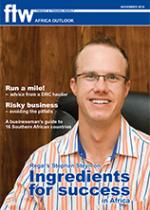Throughout the Soccer World
Cup, South African stadiums
were filled with chanting
crowds and singing voices, says
Nachi Mendelow, the marketing
representative of Compu-Clearing
Outsourcing.
This was then transmitted via
satellite to the world.
“One of the most common refrains
heard was ‘Waka Waka – This time’s
for Africa’. And, as the world’s
voices combined to sing about the
bright future of Africa, SA shone out
as leader and example – not only to
the rest of Africa, but to the world at
large.”
In trade terms this saw Africa’s
emerging markets gaining attention
– and freight movement throughout
Africa on the increase.
“As Africa continues to grow in
international commercial interest,
so too does SA’s desirability as a
cross-trade and assembly port,” said
Mendelow. “This is not only due to
port and road infrastructure, but also
to numerous other factors – including
SA’s place on the UN security council
and its expected future admission to
the Brazil, Russia, India and China
(Bric) trade bloc.”
In practical terms this sees a
large portion of freight arriving by
sea in SA - and later sent by road
throughout the continent.
Having the correct documentation
is a critical factor in cross-border
freight traffic movements, according
to Mendelow.
And Compu-Clearing, he told
FTW, has multiple solutions for cargo
travelling through Africa.
“Firstly,” he said, “we have a
special system designed specifically
for cross-border transport to the
BLNS countries (Botswana, Lesotho,
Namibia, Swaziland). This system
allows for quick and easy capturing
of data, and produces all the customs
documentation necessary – from
the bill of entry (BoE) to the road
manifest.
“Compu-Clearing is also linked
to the SA Revenue Service (Sars)
by electronic data interchange
(EDI), allowing for documents to
be processed and cleared before the
truck even arrives at the border. This
increases efficiency dramatically and
helps to reduce delays at the border.”
The freight system specialist has
also now integrated the system into
the Asycuda language used in the
BLNS – allowing a single capture of
data to produce the documentation
for both sides of the border.
It has also just released to the
market a new web-based product –
the international air waybill (AWB)
production system.
“This allows users to produce
both master and house air waybills
from anywhere in the world on
neutral, pre-printed and plain paper,”
Mendelow told FTW. “It also allows
them to produce consolidation
manifests, reserve air waybills for
future use, and to print bar-code
labels.”
“All that it needs is Internet-access
– so it is an ideal solution for many
African countries.”
Also built into the system is the
ability to save, print, view and e-mail
AWBs in PDF format.
“The system lets users easily
maintain multiple selling rates based
on specific shippers, consignees,
airlines and routes,” said Mendelow.
“Live status enquiries can be done
with a single click. The system also
includes dynamic live databases
providing accurate information on
currency, country, city and airport
codes, including information on all
major airlines.”
Compu-Clearing’s third-party
warehousing solution, STASH, is also
designed to suit the African market –
and has been used in Uganda, Congo,
Nigeria, Rwanda, Ghana and Benin.
“This,” said Mendelow, “is a
complete PC-based warehousing
solution, using the latest in Windowsbased
technology and software. It
allows users to manage and control
all cargo moving through their
warehouses and allows for easy
production of goods received notes,
goods delivered notes, stock control
sheets, and multiple operational
reports. STASH is extremely scalable
and can be used in companies ranging
from a single user up to 20-plus
users.”
Multiple systems cater for inter-Africa trade
03 Dec 2010 - by Alan Peat
0 Comments
Africa Outlook 2010

03 Dec 2010
03 Dec 2010
03 Dec 2010
03 Dec 2010
03 Dec 2010
03 Dec 2010
Border Beat
Poll
Featured Jobs
New
New
